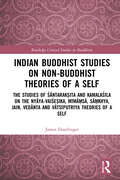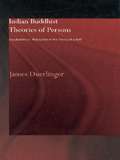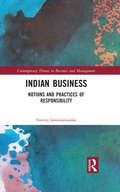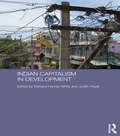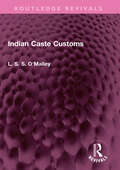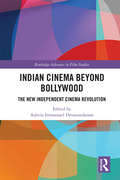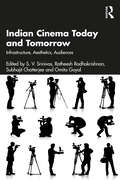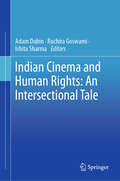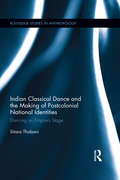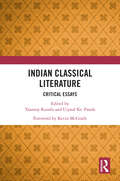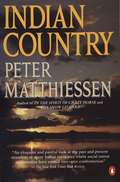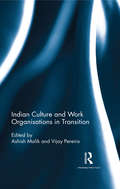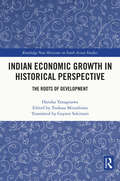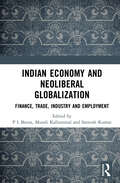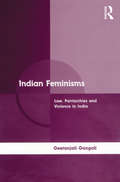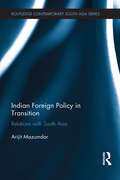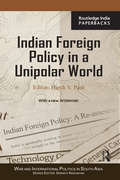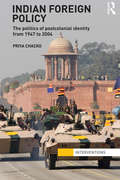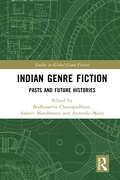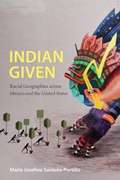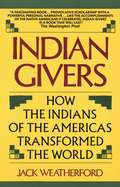- Table View
- List View
Indian Buddhist Studies on Non-Buddhist Theories of a Self: The Studies of Śāntarakṣita and Kamalaśīla on the Nyāya-Vaiśeṣika, Mīmāṃsā, Sāṃkhya, Jain, Vedānta and Vātsīputrīya Theories of a Self (Routledge Critical Studies in Buddhism)
by James DuerlingerThis book addresses prominent views on the nature of the self in Indian philosophical traditions and presents Buddhist critiques of those conceptions through the translation and commentary on Śāntarakṣita’s chapter in the Tattvasaṃgraha on theories of a self and Kamala-śīla’s commentary on it in his Tattvasaṃgrahapañjikā. The book is comprised of an introduction presenting the theories of a self in the Indian Buddhist Middle Way philosophies and in the different philosophical schools Śāntarakṣita and Kamalaśīla study and offers a background for the translation. The detailed translation that follows reveals the theories of a self that are explained in the philosophical schools in India called the Nyāya-Vaiśeṣika, Mīmāṃsā, Sāṃkhya, Jain, Advaita Vedanta, and Vātsīputrīya. It is complemented by a thorough commentary by the author which brings the text to light for a modern audience. A useful contribution to Indian philosophy and global philosophy, this book will be of interest to researchers in the fields of Philosophy, Religious Studies and Buddhist Studies.
Indian Buddhist Theories of Persons: Vasubandhu's Refutation of the Theory of a Self (Routledge Critical Studies in Buddhism)
by James DuerlingerIn this book, Vasubandhu's classic work Refutation of the Theory of a Self is translated and provided with an introduction and commentary. The translation, the first into a modern Western language from the Sanskrit text, is intended for use by those who wish to begin a careful philosophical study of Indian Buddhist theories of persons. Special features of the introduction and commentary are their extensive explanations of the arguments for the theories of persons of Vasubandhu and the Pudgalavâdines, the Buddhist philosophers whose theory is the central target of Vasubandhu's refutation of the theory of a self.
Indian Business: Notions and Practices of Responsibility (Contemporary Themes in Business and Management)
by Nimruji JammulamadakaThis book presents a critical understanding of Indian business situated as an encounter between indigeneity and Western modernity by exploring notions and practices of responsibility. It brings the paradoxical nature of Indian businesses to the fore: though they have a rich history of philanthropic contributions to social causes, they have also been known for labour rights and human rights violations, environmental abuses, destruction of habitats, pollution and corruption. The book shows how Indian firms straddle these two starkly contrasting positions and the many blends in between to conform to global developments in the pursuit of corporate social responsibility (CSR). It also looks at the emergent field of critical studies and analysis of CSR, especially from the context of a developing country. Part of the ‘Contemporary Themes in Business and Management’ series, this book will interest scholars of international business studies, management studies, economics, post-colonial management, organisational studies and corporate social responsibility, as well as businesses, corporates and practitioners.
Indian Capitalism in Development (Routledge Contemporary South Asia Series)
by Barbara Harriss-White Judith HeyerRecognising the different ways that capitalism is theorised, this book explores various aspects of contemporary capitalism in India. Using field research at a local level to engage with larger issues, it raises questions about the varieties and processes of capitalism, and about the different roles played by the state. With its focus on India, the book demonstrates the continuing relevance of the comparative political economy of development for the analysis of contemporary capitalism. Beginning with an exploration of capitalism in agriculture and rural development, it goes on to discuss rural labour, small town entrepreneurs, and technical change and competition in rural and urban manufacturing, highlighting the relationships between agricultural and non-agricultural firms and employment. An analysis of processes of commodification and their interaction with uncommodified areas of the economy makes use of the ‘knowledge economy’ as a case study. Other chapters look at the political economy of energy as a driver of accumulation in contradiction with both capital and labour, and at how the political economy of policy processes regulating energy highlights the fragmentary nature of the Indian state. Finally, a chapter on the processes and agencies involved in the export of wealth argues that this plays a crucial role in concealing the exploitation of labour in India. Bringing together scholars who have engaged with classical political economy to advance the understanding of contemporary capitalism in South Asia, and distinctive in its use of an interdisciplinary political economy approach, the book will be of interest to students and scholars of South Asian Politics, Political Economy and Development Studies.
Indian Caste Customs (Routledge Revivals)
by L. S. O'MalleyFirst published in 1932, Indian Caste Customs is an explication on how caste system operates in everyday life. What are its injunctions and prohibitions? What actions constitute offences against its moral law and social honour? What are the means by which breaches of that code are adjudicated? What are the penalties inflicted on offenders? The book attempts to answer these questions as well as discuss the merits and demerits of the caste system in India. This book will be of interest to students of history, sociology, anthropology and South Asian studies.
Indian Cinema Beyond Bollywood: The New Independent Cinema Revolution (Routledge Advances in Film Studies)
by Ashvin Immanuel DevasundaramThis is the first edited volume on new independent Indian cinema. It aims to be a comprehensive compendium of diverse theoretical, philosophical, epistemological and practice-based perspectives, featuring contributions from multidisciplinary scholars and practitioners across the world. This edited collection features analyses of cutting-edge new independent films and is conceived to serve as a beacon to guide future explorations into the burgeoning field of new Indian Cinema studies.
Indian Cinema Today and Tomorrow: Infrastructure, Aesthetics, Audiences
by S. V. Srinivas, Ratheesh Radhakrishnan, Subhajit Chatterjee, and Omita GoyalCinema has been, and is, a powerful tool for social mobilisation. The political importance of cinema was of course always well-known and has continued to evolve and grow. However, with innovations in modern technology, there has been the exponential growth of television alongside the movies, with content made especially for TV, as well as social media.This volume covers developments in Indian Cinema over the last decade. It explores an array of changes which has dramatically changed cinema — a surge of new filming and broadcasting technologies, from the camera phone to the most sophisticated digital equipment; an avalanche of talent, from trained to completely untrained actors; and a volume of content difficult to document and categorise. It also studies cinema growth and reactions to the onslaught of home entertainment and discusses its changing formats over the years, from TV to satellite, to VCRs and DVDs, serials to OTT streaming platforms.This book will be of great interest to scholars and researchers in film studies, performance studies, cultural studies, media studies, and popular culture. It will also interest professionals working in media and entertainment industries.
Indian Cinema and Human Rights: An Intersectional Tale
by Adam Dubin Ruchira Goswami Ishita SharmaThis book examines the intersection between Indian cinema (across geographic regions, languages and formats) and human rights. It analyzes Indian cinema from multiple human rights perspectives, such as freedom of expression and censorship, socio-economic rights, caste rights, women's and children's rights and LGBTQIA+ equality. The book bridges human rights law and cinema studies, and opens up new research areas within sociocultural and socio-legal academic contexts. It also contributes to academic disicplines beyond Law and Cinema, including Media, Cultural, Gender, Socio-economic and Sociology studies and is relevant for Liberal Arts curricula, Law Schools and as a reference book in university libraries in India and internationally, especially in film institutes. Finally, the book offers practical implications for human rights activists and policymakers by exploring how rights can be advanced through cinema and pop culture.
Indian Classical Dance and the Making of Postcolonial National Identities: Dancing on Empire's Stage (Routledge Studies in Anthropology)
by Sitara ThobaniIndian Classical Dance and the Making of Postcolonial National Identities explores what happens when a national-cultural production is reproduced outside the immediate social, political and cultural context of its origin. Whereas most previous studies have analysed Indian classical dance in the context of Indian history and culture, this volume situates this dance practice in the longstanding trasnational linkages between India and the UK. What is the relation between the contemporary performance of Indian classical dance and the constitution of national, diasporic and multicultural identity? Where and how does Indian dance derive its productive power in the postcolonial moment? How do diasporic and nationalist representations of Indian culture intersect with depictions of British culture and politics? It is argued that classical Indian dance has become a key aspect of not only postcolonial South Asian diasporic identities, but also of British multicultural and transnational identity. Based on an extensive ethnographic study of performances of Indian classical dance in the UK, this book will be of interest to scholars of anthropology, sociology, South Asian studies, Postcolonial, Transnational and Cultural studies, and Theatre and Performance studies.
Indian Classical Literature: Critical Essays
by Tanmoy Kundu and Ujjwal Kr. PandaThis book critically analyses classical Indian literature and explores the philosophical, literary, and cultural landscapes which have emerged in response to ancient Indian texts. It highlights the relevance of these texts and studies and how they have come to influence modern Indian literature in various ways. The authors look at classical literature both as a theoretical premise that primarily seeks to develop new knowledge and as a sphere of serious modern/postmodern critical attention. The volume features essays on key texts including Abhijnanasakuntalam, The Cilappatikaram: A Tale of An Anklet, Mrichchakatika, Panchatantra, and Mahabharata.A useful guide to ancient Indian texts, the book will be indispensable for students and researchers of mythology and classical literature, literary and critical theory, Indian literature, Sanskrit studies, and South Asian studies.
Indian Country
by Peter MatthiessenAfter winning an eight year legal battle, here is the controversial book that powerfully sheds new light on the plight of Native Americans. Matthiessen's urgent accounts and absorbing journalistic details make it impossible to ignore the message they so eloquently proclaim.
Indian Culture and Work Organisations in Transition
by Vijay Pereira Ashish MalikThis book analyses key theoretical influences on Indian culture in a business context. It shows the interactions between indigenous culture and workplace ethics which is increasingly being populated by multinational corporations. It discusses how the Indian workplace has evolved over time as well as retained some managerial practices dating back to the classical traditions of ancient India. It further demonstrates the changes brought about by globalisation, especially through information technology and business process outsourcing industries. This volume will be useful to the scholars and researchers of business and management studies, cultural studies, Asian studies as well as human resource (HR) professionals.
Indian Economic Growth in Historical Perspective: The Roots of Development (Routledge New Horizons in South Asian Studies)
by Haruka YanagisawaThis book investigates the roots of rapid economic growth of India in recent decades, by exploring historical processes from the late colonial period. Based upon decades-long archival and field research, this book deals with the period from the late nineteenth century to 2013 and offers an integral viewpoint of the economic history of India. While critiquing the conventional understanding that links recent economic growth only with the development of high-tech, export-oriented service sectors under the liberalized economy, the book suggests deeper and wider roots of development that had a cumulative effect in three stages. Firstly, the agrarian development and rural socio-economic changes from the end of the nineteenth century. Secondly, the state-led import-substitution industrialization since 1950 that established the industrial foundations for future economic growth. Thirdly, the economic reforms since 1991 that helped technology-intensive industries find new markets with improved quality of production. For the first time available in English, this book by the late Professor Haruka Yanagisawa, who was a leading figure in the South Asia studies collective in Japan, is an important contribution to the academic tradition of economic history of India It will be of interest to researchers in the field of social and economic history, sociology, anthropology and economies of South Asia.
Indian Economy - 1 and 2 First Semester FYBA New NEP Syllabus - SPPU
by Dr Sunil Ugale Dr Amol Gaikwad Dr Manisha AherThe book Indian Economy - 1 & 2 is a comprehensive guide tailored for F.Y.B.A. students under the NEP 2024 syllabus. Authored by Dr. Sunil Ugale, Dr. Amol Gaikwad, and Dr. Manisha Aher, it provides an in-depth exploration of India's economic framework. The text covers foundational topics such as the meaning and classification of economies, indicators of development, and the structure of India's economy, emphasizing its developing status. It delves into the role of agriculture, industry, and services in economic growth, highlighting sectoral contributions to GDP and employment. Additionally, practical insights on India's demographic profile and the interplay of population as human capital underscore the book's focus on economic development challenges, such as poverty, inequality, and infrastructure deficits. The accessible language and adherence to academic requirements make it an essential resource for students and competitive exam aspirants.
Indian Economy and Neoliberal Globalization: Finance, Trade, Industry and Employment
by P L Beena, Murali Kallummal and Santosh KumarThis book assesses the effects of globalization and neoliberal economic regimes in low- and middle-income countries, primarily on industries, investment and trade; finance and credit; and employment, gender and development. The volume – written to honour the rich academic work of the eminent economist Professor C. P. Chandrasekhar – addresses issues which are relevant to emerging economies and their concerns around development, investment, financial planning and adopting new technologies. It analyses the new financial systems and institutions and the dominance of global finance in policymaking in these countries and their effects in the postpandemic period. It examines the changing contours of finance, trade and labour models and laws in developing countries to assess the risks and concerns of economic crises and challenges. The volume does justice to an assessment of the macroeconomic and developmental implications of neoliberal policies in India while offering an insightful overview of the new economic practices and policies. It also offers suggestions and measures to address concerns regarding banking and global liquidity, reinforce robust strategies for growth in both small and large industries and bring in reform. This book will be of interest to scholars and students of economics, political economy, finance and trade, development studies and South Asian studies.
Indian English and the Fiction of National Literature
by Rosemary Marangoly GeorgeDuring the twentieth century, at the height of the independence movement and after, Indian literary writing in English was entrusted with the task of consolidating the image of a unified, seemingly caste-free, modernising India for consumption both at home and abroad. This led to a critical insistence on the proximity of the national and the literary, which in turn, led to the canonisation of certain writers and themes and the dismissal of others. Examining English anthologies of 'Indian literature', as well as the establishment of the Sahitya Akademi (the national academy of letters) and the work of R. K. Narayan and Mulk Raj Anand among others, Rosemary George exposes the painstaking efforts that went into the elaboration of a 'national literature' in English for independent India even while deliberating the fundamental limitations of using a nation-centric critical framework for reading literary works.
Indian Feminisms: Individual And Collective Journeys
by Poonam Kathuria Abha BhaiyaThis collection of essays focuses on the post-1980s period of the Indian feminist movement, a moment rich in new and different modes of resistance, of widespread political engagements with issues of rights, of justice, of identity and much more. The writers here, all well-known activists and founders of some of the most important of feminist institutions, describe their individual and collective journeys, bringing attention to the movement, to their struggles, their campaigns, their victories and the challenges they have faced. In using the tools of feminist analysis - a focus on life stories, on oral accounts, on group formation and more - they also make a case for advocacy through legal and socio-political means. Despite being one of the most dynamic of feminist movements in the world, the Indian feminist movement has seldom been recognized as such. And yet, in addressing how women's oppression and discrimination lie at the intersection of complex inequalities of caste, of region and religion, of class, of patriarchy, race, ethnicity, to name only a few, the writers in this volume make a case for the need for constant introspection, reflection and self-questioning, so that the movement can learn and grow. They show how in India, and indeed across much of South Asia, it is feminists who have stood against capitalism, war and violence, environmental degradation and fundamentalism and have forged alliances with varied movements, learning from them, working strengthening them but also infusing them with a feminist analysis.
Indian Feminisms: Law, Patriarchies and Violence in India
by Geetanjali GangoliContributing to debates on feminism, this book considers the impact made by feminists in India from the 1970s. Geetanjali Gangoli analyses feminist campaigns on issues of violence and women’s rights, and debates on ways in which feminist legal debates may be limiting for women and based on exclusionary concepts such as citizenship. She addresses campaigns ranging from domestic violence, rape, pornography and son preference and sets them within a wider analysis of the position of women within the Indian state. The strengths and limitations of law reform for women are addressed as well as whether legal feminisms relating to law and women's legal rights are effective in the Indian context. The question of whether legal campaigns can make positive changes in women’s lives or whether they further legitimize oppressive state patriarchies is considered. The recasting of caste and community identities is also assessed, as well as the rise of Hindu fundamentalism and the ways in which feminists in India have combated and confronted these challenges. Indian Feminisms will interest researchers and students in the areas of feminism, law, women’s movements and social movements in India, and South Asia more generally.
Indian Foreign Policy in Transition: Relations with South Asia (Routledge Contemporary South Asia Series)
by Arijit MazumdarIndia’s relation with other South Asian countries has been impacted by recent developments in the post-Cold War period. These include India’s economic rise, the recent democratic transitions in many South Asian countries and greater US engagement in the region following 9/11. This book is an effort to address these issues and examine their role in India’s interactions with its neighbours. Indian Foreign Policy in Transition provides a comprehensive overview of India’s relations with the South Asian countries of Pakistan, Afghanistan, Bangladesh, Sri Lanka and Nepal, Bhutan and the Maldives. As well as looking at India’s past and present foreign policy, the book analyses recent political changes and developments. It identifies the broad tenets of India’s policy towards the other countries of South Asia, and the domestic factors that impact India’s policy in the region. It looks at India’s historical patterns of interactions with its neighbours, and describes recent developments in these South Asian countries and their perceptions of India. By providing specific examples of the major disputes and conflicts between India and its neighbours, the book explores the challenges inherent in promoting peace and cooperation, and goes on to highlight the growing US influence in South Asia. Providing an in-depth discussion on the opportunities and challenges facing India in the South Asia region, the book is an important contribution to Indian and South Asian Politics, Foreign Policy, and International Relations.
Indian Foreign Policy in a Unipolar World (War And International Politics In South Asia Ser.)
by Harsh V. PantIndia's foreign policy, out of the structural confines of the Cold War strategic framework, has become more expansive in defining its priorities over the last few years. With the rise of its economic and military capabilities and strategic interests, India has shaped a diplomacy that is much more aggressive in the pursuit of those interests. Tracing the trajectory of India's foreign policy in the 21st century, this book examines the factors that have shaped the Indian response towards this emerging international security environment. Including a new Afterword, this updated volume looks at the major influences that have shaped India's foreign policy in recent years, in the context of its engagements with strategically important regions across the globe, and its relations with major global powers.The volume will prove invaluable to those studying politics and international relations, diplomatic and political history, defence and military studies, and South Asian studies.
Indian Foreign Policy: The Politics of Postcolonial Identity from 1947 to 2004 (Interventions)
by Priya ChackoThe rise of India as a major power has generated new interest in understanding the drivers of its foreign policy. This book argues that analysing India’s foreign and security policies as representational practices which produce India’s identity as a postcolonial nation-state helps to illuminate the conditions of possibility in which foreign policy is made. Spanning the period between 1947 and 2004, the book focuses on key moments of crisis, such as the India-China war in 1962 and the nuclear tests of 1972 and 1998, and the approach to international affairs of significant leaders like Jawaharlal Nehru. The analysis sheds new light on these key events and figures and develops a strong analytical narrative around India’s foreign policy behaviour, based on an understanding of its postcolonial identity. It is argued that a prominent facet of India’s identity is a perception that it is a civilizational-state which brings to international affairs a tradition of morality and ethical conduct derived from its civilizational heritage and the experience of its anti-colonial struggle. This notion of ‘civilizational exceptionalism’, as well as other narratives of India’s civilizational past, such as its vulnerability to invasion and conquest, have shaped the foreign policies of governments of various political hues and continue to influence a rising India.
Indian Genre Fiction: Pasts and Future Histories (Studies in Global Genre Fiction)
by Bodhisattva Chattopadhyay Aakriti Mandhwani Anwesha MaityThis volume maps the breadth and domain of genre literature in India across seven languages (Tamil, Urdu, Bangla, Hindi, Odia, Marathi and English) and nine genres for the first time. Over the last few decades, detective/crime fiction and especially science fiction/fantasy have slowly made their way into university curricula and consideration by literary critics in India and the West. However, there has been no substantial study of genre fiction in the Indian languages, least of all from a comparative perspective. This volume, with contributions from leading national and international scholars, addresses this lacuna in critical scholarship and provides an overview of diverse genre fictions. Using methods from literary analysis, book history and Indian aesthetic theories, the volume throws light on the variety of contexts in which genre literature is read, activated and used, from political debates surrounding national and regional identities to caste and class conflicts. It shows that Indian genre fiction (including pulp fiction, comics and graphic novels) transmutes across languages, time periods, in translation and through publication processes. While the book focuses on contemporary postcolonial genre literature production, it also draws connections to individual, centuries-long literary traditions of genre literature in the Indian subcontinent. Further, it traces contested hierarchies within these languages as well as current trends in genre fiction criticism. Lucid and comprehensive, this book will be of great interest to academics, students, practitioners, literary critics and historians in the fields of postcolonialism, genre studies, global genre fiction, media and popular culture, South Asian literature, Indian literature, detective fiction, science fiction, romance, crime fiction, horror, mythology, graphic novels, comparative literature and South Asian studies. It will also appeal to the informed general reader.
Indian Geography For IAS Prelims Competetive Exam
by Indic TrustThis is a compilation of questions answer of Indian Geography for Prelims Exam.
Indian Given: Racial Geographies across Mexico and the United States
by María Josefina Saldaña-PortilloIn Indian Given María Josefina Saldaña-Portillo addresses current racialized violence and resistance in Mexico and the United States with a genealogy that reaches back to the sixteenth century. Saldaña-Portillo formulates the central place of indigenous peoples in the construction of national spaces and racialized notions of citizenship, showing, for instance, how Chicanos/as in the U.S./Mexico borderlands might affirm or reject their indigenous background based on their location. In this and other ways, she demonstrates how the legacies of colonial Spain's and Britain's differing approaches to encountering indigenous peoples continue to shape perceptions of the natural, racial, and cultural landscapes of the United States and Mexico. Drawing on a mix of archival, historical, literary, and legal texts, Saldaña-Portillo shows how los indios/Indians provided the condition of possibility for the emergence of Mexico and the United States.
Indian Givers: How the Indians of the Americas Transformed the World
by Jack Weatherford"As entertaining as it is thoughtful. . . . Few contemporary writers have Weatherford's talent for making the deep sweep of history seem vital and immediate. " THE WASHINGTON POST After 500 years, the world's huge debt to the wisdom of the Indians of the Americas has finally been explored in all its vivid drama by anthropologist Jack Weatherford. He traces the crucial contributions made by the Indians to our federal system of government, our democratic institutions, modern medicine, agriculture, architecture, and ecology, and in this astonishing, ground-breaking book takes a giant step toward recovering a true American history.
